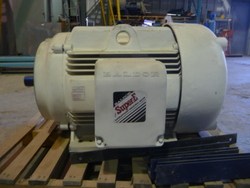Electric motors are marvels of engineering, but they are not invulnerable.
Of the many hazards that can lead to a damaged AC motor, none are as common as unfavorable environmental factors. Here’s a brief review of some of the more common environmental conditions that will send your electric motor to the repair shop sooner than you anticipated, as well as some general advice on how to keep them up and running longer.
1. Extreme Temperatures
The most common risk factor for the average electric motor is extreme temperature, either hot or cold. AC motors have optimal temperature ranges for peak operational performance that are determined by their manufacturers after a great deal of testing. So, make sure to adhere to these specifications closely to keep the motors you’re using in good working order. In general, industrial AC motors operate best at ambient temperatures between +40° to -20° Celsius (C).
In settings where the air temperature will fall below -20° C (or -4° Fahrenheit), you’ll need to make sure your AC motors are properly lubricated. Grease-lubricated bearings will need to be coated with grease recommended by the manufacturer as suitable for low-temperature conditions. Oil-lubricated bearings will need a thermostat-regulated oil-sump heater to warm the oil.
An overly hot environment, where the air temperature exceeds +40° C (or 104° F), can also lead to short motor life. If a motor must operate under such conditions (and you have no other ambient cooling/ventilation measures), you may need to rewind the motor to a higher class of insulation (or simply choose an oversize motor to begin with).
2. Altitude
In terms of harsh environmental conditions, the altitude at which an AC motor must operate is also a major concern. Typically, industrial motors are designed for operation up to an altitude of 1000 meters (3281 feet), where ambient air has less cooling capacity.
There’s a good rule of thumb for altitude: For every additional 100-meters in altitude above 1000 meters, a motor must be de-rated by 1%. Thus, at an altitude of 2000 meters, a motor would need to be de-rated by 10%. So you should probably choose a motor the next size up.
3. Poor Ventilation
An often overlooked environmental factor that can compromise the operation of an AC motor is, simply put, dirty (or salty) air. If you must operate an AC motor in an extremely dirty or salty environment, consider upgrading it to an enclosed model with good ventilation.
A Totally Enclosed Fan-Cooled (TEFC) motor is probably your best bet in these conditions. TEFC motors use a shaft-mounted fan to blow cooling air over a ribbed frame to dispel heat. Or you could go with a Totally Enclosed Air-to-Air Cooled (which has an air-to-air heat exchanger) or Totally Enclosed Water-to-Air Cooled (which has a water-to-air heat exchanger) motor type.
With so many variables to consider, one of the best pieces of advice you can get is to discuss your requirements with a knowledgeable professional, who can review all the options with you. That’s where we come in — feel free to contact us today.



